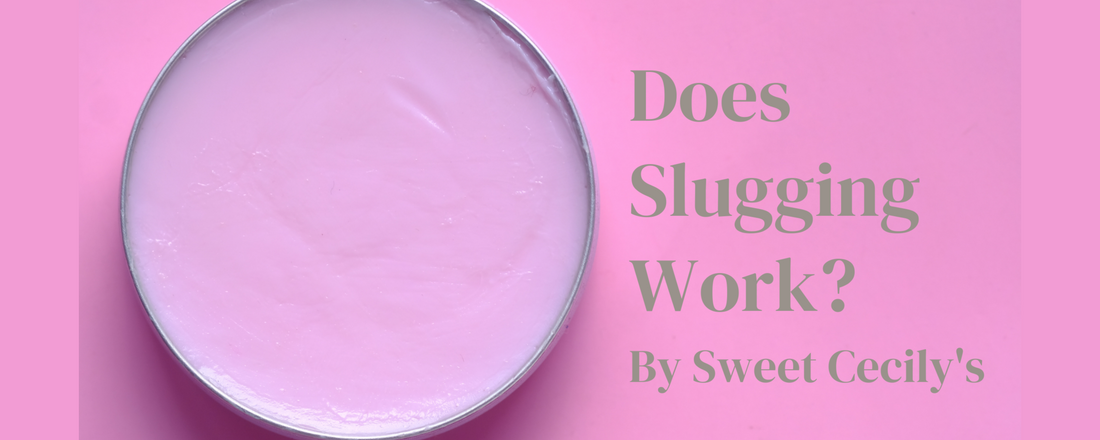
To Slug or Not To Slug? The Slimy Skincare Trend People Swear By
Share
Slugging, it’s the skincare trend that has seen an influx of tiktokers lathering their face in a thick layer of petroleum jelly before bed. Its rise in popularity has seen great numbers of people put this technique to the test. Although its kind of gross, many people now swear by it! The overall response for slathering your face with an occlusive substance has been somewhat positive. However, when digging deeper into how slugging effects the environment, it's not all good news.
What is it?
This technique is thought to have originated in Korea many years ago. However, in recent years, its ever-growing popularity within the K-beauty industry has seen #Slugging with over 274.4 million views on the social media platform Tiktok.
You may be wondering if the term “slugging” has anything to do with the slimy little creatures that live in your garden. Well, it is, to a certain extent. This technique is called slugging because of the way you coat your face in a petroleum-based product. When your face is covered in a product like Vaseline, it somewhat resembles the greasy substance left behind from a slug. Hence where the name came from.
Now I know what you are probably thinking right now, that’s gross! Don’t worry, I think the same. However, many people have jumped on this trend and now use it as part of their Evening Skincare Routine on a regular basis.
What Does it Do?
Some experts in the makeup and skincare field have claimed that practicing slugging is beneficial for keeping the skin hydrated and looking fresh. On the other hand, several people have raised their concern over the technique. With many skincare professionals saying that applying a thick layer of product which has been described as “like a plastic sheet on the face”, will most definitely cause problems for the skin. Regardless of the criticism on its possible negative impacts for your face, people continue to “slug” around the world.
The Science Behind the Slug
Dousing your face in a greasy occlusive substance before bed will create a barrier layer on the skin. When you do this before bed, it may help to prevent loss of water as it is unable to pass through the thick layer of petroleum. According to those who dote on this method, you will wake up the next day with extremely soft and hydrated skin. Slugging may be able to reduce potential overnight damage from external elements and factors.
Suitable Skin Types
The research has found that although this trend has been helpful to many of the people who have tried it, it may not be suitable for everyone. The target audience for this technique are those who have typically dry skin that feels dehydrated and tight in the morning. Slugging may be a helpful way to provide them with an extra hydration boost.
However, if you have oilier skin (like me!) or are prone to breakouts, then it is not for you. Adding extra oiliness when your skin is already oily will only end badly and probably in more spots.
Popular Products For Slugging
Traditional methods of slugging use a petroleum-based product as it is very thick in consistency. The most popular being Vaseline and this is no surprise as it is cheap to buy and can be bought in almost every shop.
The old-fashioned petroleum jelly has been a staple item in the medicine cupboard for years. Its uses range form preventing chapped lips to treating fungal nail infections.
The Harsh Reality of Slugging
If you have read this far, you will probably be thinking that Slugging sounds great as it will leave your face feeling seriously hydrated and smooth. But it comes at a cost. A major cost to the environment.
Petroleum jelly is the most common product used for slugging however, where is comes from is not often thought about by those who use this method.
Petroleum jelly is a by-product of petroleum which is a form of crude oil. Initially discovered in the 1800’s at the bottom of oil rigs. Workers on the oil rigs noticed a waxy like substance forming around their machinery and decided to use it on cuts and bruises. Fast forward to today, you will find petroleum jelly in tattoo shops, hospitals, supermarkets, and households.
The truth is petroleum jelly is not eco-friendly and when we are trying hard to slow down climate change, using petroleum will certainly not help. The production of petroleum is one that is contributing negatively towards global warming through incidents such as oil spills and acid rain. It goes without saying that the damage caused by this substance also becomes an issue and is sometimes fatal to wildlife and marine life.
But that isn’t all, one of the main compounds found in crude oil is something called Polycyclic aromatic hydrocarbon. When exposed to these chemicals, they have been found to cause serious effects on the human body. Complications can occur in all parts of the body including the central nervous system (your brain and spinal cord) and cardiovascular system (heart and blood vessels). The hydrocarbons also have a rather worrying ability to disrupt hormone levels due to its ability to alter the endocrine system.
You Can Still Practise Slugging (But Opt For a Natural Alternative)
You still want to slug? But you don’t want to be applying something that is causing harm to you and the environment? You need to try a natural alternative!
Thankfully, for those of you who want to reap the rewards that slugging has to offer, there are plenty of natural alternatives out there. All of which are much more eco and human friendly.
Some of the best alternatives include –
- Cocoa Butter
- Coconut Oil
- Shea butter
- Jojoba Oil
Not only will those raw ingredients be safe to use, but they are also all great for you skin.
To Slug or Not To Slug.
You may feel conflicted on whether you should be trying out this technique. What I would say is, although the facts behind traditional slugging are negative, it's not the be all and end all. If you have dry skin and you are looking for a way to give your skin some much needed moisture, slugging with a natural product may be beneficial for you.
If you are looking for a way to give your skin some serious TLC without coating it in a thick greasy product, then try our Almond and Avocado Face Cream. It is packed full of nourishing natural ingredients such Shea butter, Almond Oil and Vitamin E Oil.

